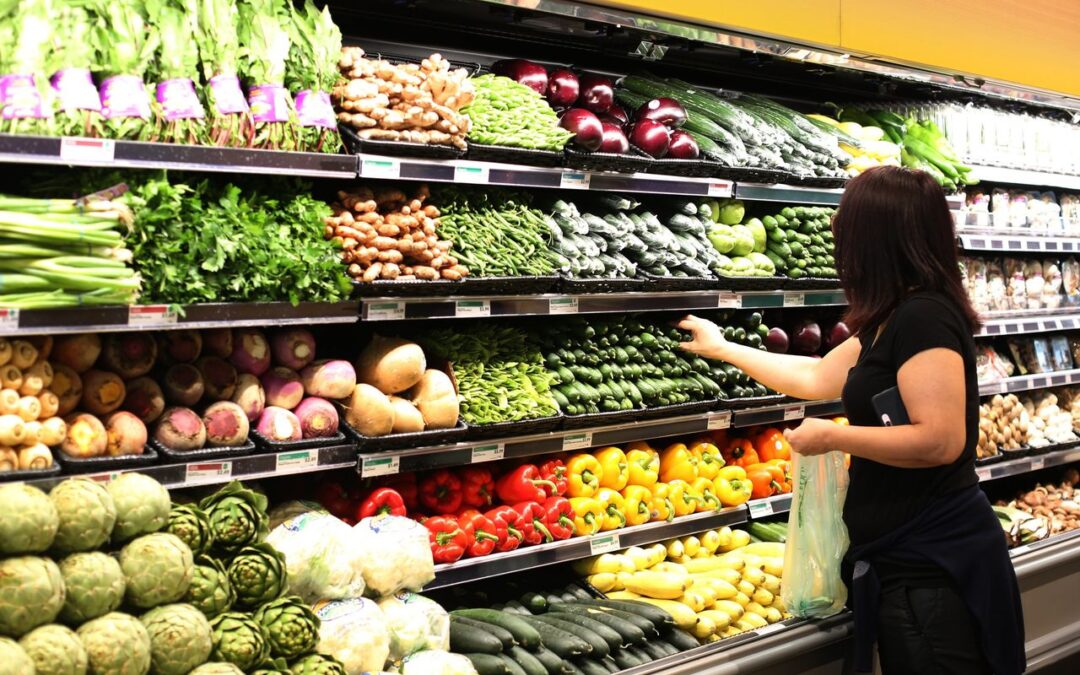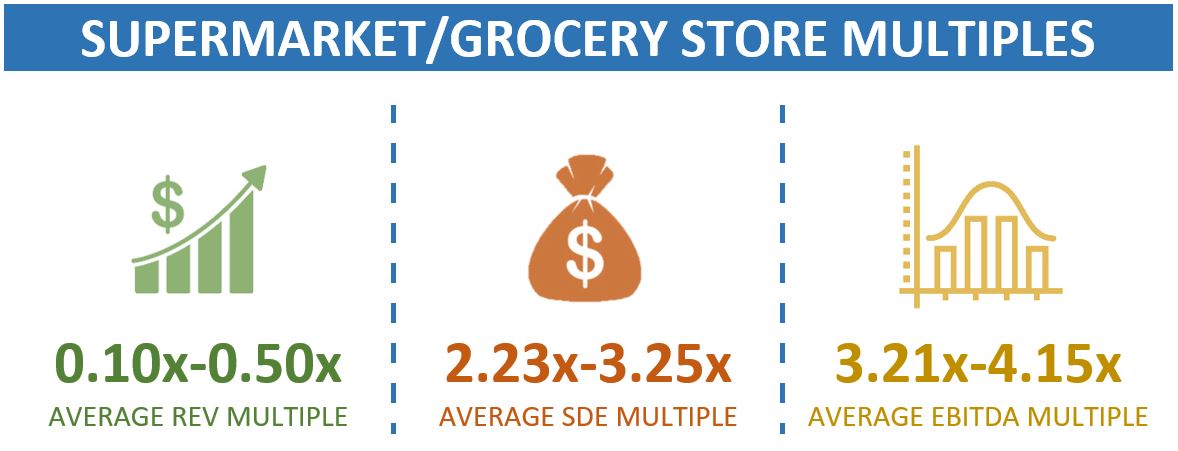
Valuation Multiples for Grocery Stores/Supermarkets
The supermarket and grocery store industry includes businesses primarily engaged in retailing general food. This includes canned and frozen foods, fresh fruits and vegetables, and fresh and prepared meats, fish, and poultry. There are over 66,000 supermarkets and grocery stores across the United States. This industry generates over $666 billion in revenue. Growth in this industry is stable as the need for general retail food is constant. As such, you may be looking to buy or sell a grocery store or supermarket. One of the first steps in doing so is understanding the value of a grocery store. A business appraiser uses valuation multiples for grocery stores to determine the value. Schedule a free consultation to get started!
Valuing a Grocery Store or Supermarket
Knowing the value of a grocery store or supermarket can help you make informed decisions. If you plan on selling a business, a business valuation can help determine a fair market value. It can also help with negotiations between potential buyers. As a buyer of a grocery store, a business appraisal for a grocery store can help determine a fair purchase price. Peak Business Valuation, business appraiser Utah, values supermarkets regularly. We are here to help you feel confident in the transaction of a grocery store or supermarket. Get started by scheduling your free consultation today!
How does a valuation expert determine the fair market value of a grocery store or supermarket? A valuation expert values a supermarket or grocery store using a variety of valuation approaches. This includes using valuation multiples for a grocery store or supermarket. Below is a brief overview of what valuation multiples for a grocery store or supermarket look like. These numbers are only a guide, there are many factors that impact the valuation multiple the expert uses. For a more extensive valuation and specific information about a grocery store or supermarket, schedule a free consultation.
Be sure to also check out our articles on How to Value a Grocery Store or Supermarket and Valuing a Grocery Store or Supermarket. As well as Value Drivers for a Grocery Store.
Valuation Multiples for Grocery Stores and Supermarkets
Disclaimer: These multiples are for educational purposes only. As such, the information provided does not constitute valuation advice. These multiples do not represent the valuation opinion of Peak Business Valuation or its valuation professionals. Instead, seek the guidance and advice of a qualified business valuation professional about any matter in this article.
What is a Valuation Multiple?
A valuation multiple is like a ratio. A ratio compares two factors to each other. For instance, a common ratio in business valuation is an SDE multiple. An SDE multiple compares the seller’s discretionary earnings of the business, with the implied value of the company. A business valuation expert uses valuation multiples of similar grocery stores that recently sold when determining the valuation multiple for your supermarket. This method provides a range of value for the grocery store or supermarket being bought or sold.
For instance, a supermarket has $420,000 in SDE earnings. The valuation analyst applies a 3.12x multiple to the business. In this case, the implied value of the supermarket is $1,310,400. ($420,000 times 3.12x) On the contrary, a 2.63x SDE multiple would imply the value of the company would be $1,104,600. ($420,000 times 2.63x)
As a business appraiser, Peak Business Valuation works with dozens of individuals who are looking to buy, sell, or expand a grocery store or supermarket. As we have worked with multiple grocery stores here is a range of valuation multiples that supermarkets and grocery stores transact at and are valued at. Every grocery store is unique and as such the range of value can be significant. Below we discuss SDE, EBITDA, and REV multiples for a grocery store or supermarket.
SDE Multiple
Average SDE Multiple range: 2.23x – 3.25x
According to our data, grocery stores transact between a 2.23x – 3.25x average SDE multiple. To get an implied value of a grocery store, apply the SDE multiple by the most recent 12-month revenue. The calculation is as follows:
SDE X Multiple = Value of the Business
For instance, a supermarket generates $490,000 in sellers’ discretionary earnings. It transacts at a 2.46x multiple. Then the business value is approximately $1,205,400.
$490,000 X 2.46x = $1,205,400
Seller’s discretionary earnings is a common cash flow multiple a valuation expert uses in valuing small business transactions. It is especially useful when valuing a supermarket or grocery store. A valuation expert starts by calculating the company’s operating profit and adding back potential expenses that may not be incurred by a new owner. These expenses may include the owner’s compensation, the owner’s personal expenses, and other expenses such as non-recurring or non-related business items.
EBITDA Multiple
Average EBITDA Multiple range: 3.21x – 4.15x
The average EBITDA multiples for a supermarket range between 3.21x – 4.15x. A valuation expert applies this multiple to EBITDA to derive an implied value of the business. The calculation is as follows:
EBITDA X Multiple = Value of the Business
For example, a supermarket has an EBITDA of $850,000 and transacts at an EBITDA multiple of 3.39x. Using the above metrics, the supermarket is worth approximately $2,881,500.
$850,000 X 3.39x = $2,881,500
An EBITDA multiple measures a company’s return on investment (ROI). This multiple is preferred as it is normalized for differences in capital structure, taxation, and fixed assets. Normalized ratios allow for comparisons to similar businesses. Normalized ratios also more accurately represent the future earnings a buyer can expect from the business.
REV Multiple
Average REV Multiple range: 0.10x – 0.50x
According to our data, grocery stores or supermarkets sell for an average of 0.10x – 0.50x revenue multiple. A valuation expert calculates the implied value of the business by multiplying the amount of revenue or sales a grocery store makes by the valuation multiple.
Revenue X Multiple = Value of the Business
For instance, if a grocery store makes $1,230,000 in revenue and transacts at a 0.26x multiple, then the business is worth approximately $319,800
$1,230,000 X 0.26x = $319,800
A valuation expert will determine what valuation approaches are most applicable when valuing the grocery store or supermarket. In some cases, a revenue multiple is less frequently relied on because it does not consider the operations of the business. Therefore, it is important to use cash flow multiples – SDE and EBITDA. Cash flow multiples consider expenses such as COGS, salaries, rent, expenses, etc., that impact cash flow.
Summary
When looking at valuation multiples for a grocery store, understand that many factors impact the business and the multiple a valuation expert uses. As such, Peak Business Valuation would love to talk with you more about the value of a supermarket and the factors that impact the value.
Peak Business Valuation, business appraiser Utah, works with individuals looking to buy or sell a grocery store or supermarket across the country. We are happy to answer any questions you have about valuing a grocery store or supermarket. Get started by scheduling your free consultation by clicking the link below!
Schedule Your Free Consultation Today!

